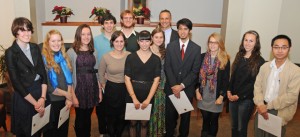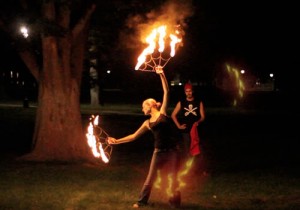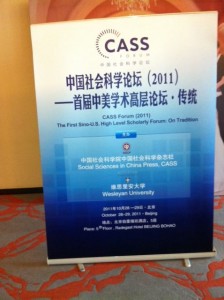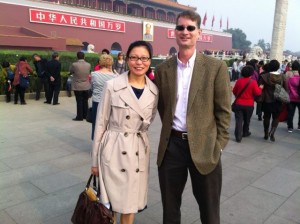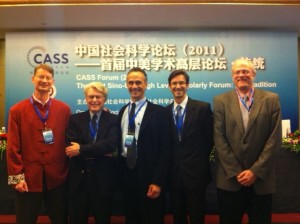On Sunday our faculty forum listserve received an email forwarded by Prof. Donald Moon from colleagues at the University of California at Berkeley. The message described the excessive use of force by UC Berkeley police in their attempt to dismantle tents in Sproul Plaza. I was in that plaza a couple of weeks ago, speaking nearby at Berkeley’s Townsend Center for the Humanities. I was shocked to read that one of my hosts, Celeste Langan, the director of the Center, was arrested and manhandled along with several students, staff and faculty who were protesting peacefully. Here’s the beginning of Prof. Langan’s comment on what happened:
I participated in the Occupy Cal rally on Sproul Plaza on November 9 (my sign, “We’re Afraid for Virginia Woolf,” made it to the Daily Cal’s top 10) and stayed for the general assembly. The organizers of Occupy Cal asked those who were willing to stay and link arms to protect those who were attempting to set up the encampment; I chose to do so. I knew, both before and after the police gave orders to disperse, that I was engaged in an act of civil disobedience. I want to stress both of those words: I knew I would be disobeying the police order, and therefore subject to arrest; I also understood that simply standing, occupying ground, and linking arms with others who were similarly standing, was a form of non-violent, hence civil, resistance. I therefore anticipated that the police might arrest us, but in a similarly non-violent manner. When the student in front of me was forcibly removed, I held out my wrist and said “Arrest me! Arrest me!” But rather than take my wrist or arm, the police grabbed me by my hair and yanked me forward to the ground, where I was told to lie on my stomach and was handcuffed. The injuries I sustained were relatively minor–a fat lip, a few scrapes to the back of my palms, a sore scalp–but also unnecessary and unjustified. You can read more at: http://utotherescue.blogspot.com/2011/11/why-i-got-arrested-with-occupy-cal-and.html
Here’s a YouTube video that includes her arrest:
http://www.youtube.com/watch?feature=player_embedded&v=kNHXuf6qJas
As indicated in the email from Berkeley, the absurdity of the university’s response is best summarized by Steven Colbert: http://www.colbertnation.com/the-colbert-report-videos/402024/november-10-20
Berkeley, like Wesleyan, has a long and proud tradition of protest. As a student here I participated in protests, and now as president I have been (and likely will be again) their object. I can imagine (with dread) extreme situations in which force would be required to preserve campus safety and our ongoing operations. As students, staff and faculty make their voices heard, however, the university’s responsibility is to protect their rights, even as it ensures that the educational mission of the school continues. Our joint responsibility is for the future of an open and safe campus environment where learning, grounded in freedom of thought and expression, continues.
Prof. Langan wrote that she was defending liberal education in Sproul Plaza — that she was defending an idea of the university that is being dismantled by political and education leaders who support only the most narrow forms of instrumental training. Prof. Langan’s idea of the university emphasizes the links between the practice of free thinking and the cultivation of freedom in the years after graduation. She is a teacher and a student of Thoreau, the author of Walden and of Civil Disobedience, who understood how our American emphasis on the bottom line can make us blind to the world before our eyes and to our possibilities for change. Thoreau wrote: We should seek to be fellow students with the pupil, and should learn of, as well as with him, if we would be most helpful to him. But I am not blind to the difficulties of the case; it supposes a degree of freedom which rarely exists.
At Wesleyan we believe strongly in this degree of freedom as we build a home for learning. And our colleagues on the West Coast, the faculty and staff who stood shoulder to shoulder with students at Berkeley, were exercising “a degree of freedom which rarely exists.” Their peaceful efforts to protest the dismantling of a once great university deserve our respect. The violent response to these efforts deserves our condemnation.



